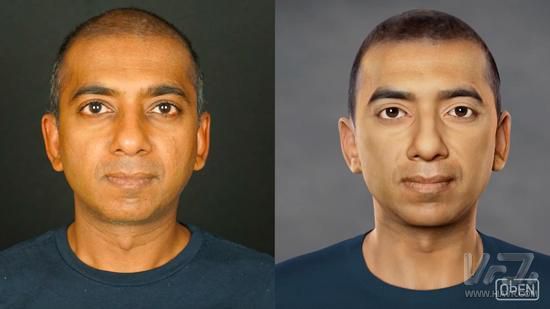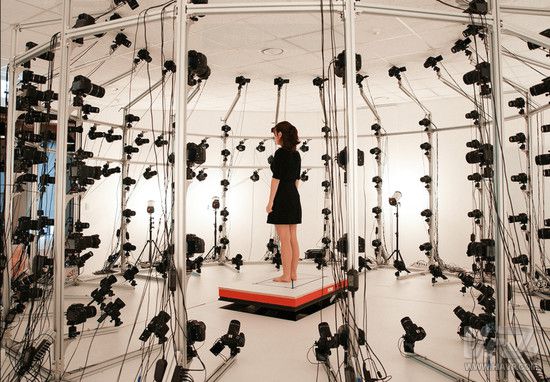Foreign media Tech in Asia recently wrote about the development of digital virtual human bodies. Unlike traditional humanoid robots, this type of virtual clone has no physical body. The Californian startup ObEN, which is dedicated to "individualized artificial intelligence," is working with Korean entertainment companies to create a virtual image for popular music stars so that they can use it to interact more with fans. Virtual cloning can also have emotional capabilities that can be used in customer service, healthcare, education, and more. ObEN is the first AI company invested by Japan's Softbank and has also received investment from Tencent. "What if there was another I was playing with my children?" Nikhil Jain raised the issue with himself after he could not balance the company's business and family life again. "Every time I go on business, my children will miss me very much, because they are used to having me by their side," explains Jayne. As CEO of ObEN, a California-based startup company, he travels to Asia once a month. In order to find a solution that can balance his work and life, Jann founded ObEN. In 2014, he co-founded the company with Adam Zheng and devoted himself to the so-called "personalized artificial intelligence" (hereinafter referred to as "PAI"). PAI refers to a virtual digital avatar that can be trained to accomplish tasks that you don't have time to complete or can't do. "You can make it useful through training," says Jaen, born in Mumbai. "I can't speak Chinese, but my personal AI can say." Many technicians have long been obsessed with the concept of humanoid robots that are difficult to distinguish between true and false. What a company like ObEN is doing is subtracting a step on this basis - there is no physical body. Instead, they want to create a 3D virtual avatar, give this avatar the size and voice, and have the ability to be smart enough to perform at least the simple task of presenting: customer service requests, read aloud, and interact with celebrities and fans. . ObEN is working with South Korean entertainment giant SM Entertainment to create PAI for many of its Korean pop superstars. In June, the two companies cooperated to establish a joint venture in Hong Kong called AI Stars Limited. “Star hopes to be able to interact with fans more,†explains Jayne. “And AI has unlimited time to interact with an unlimited number of fans.†According to data cited by Korea’s Creative Content Agency, South Korean pop music sales reached US$4.7 billion last year. Korean pop music is the most prolific, such as the EXO, a men's music group that sold more than 1 million records this year. By establishing cooperation with star brokers and managers, ObEN can obtain non-public data and create one-on-one Q&A sessions for stars. “A lot of fans want to know the daily life of their favorite celebrity: What to eat for lunch, what movie they like,†said Jayne. ObEN plans to launch its first celebrity virtual avatars mid-year next year. In addition to cooperating with South Korean pop singers, the startup also holds hands with the Bollywood star of India. Bollywood is another large entertainment market where ObEN can tap customers. According to consulting firm Deloitte, by 2020, the Indian film industry is expected to achieve revenue of 3.7 billion U.S. dollars. However, in the future, the role of virtual digital avatars will go far beyond improving productivity. By creating a virtual version of a person, businesses and users can gather more information about how people respond to their virtual avatars — and adjust their service designs accordingly. Take Jain as an example, he can observe how his child interacted with his PAI when he was not at home. "I can see what my child said to my PAI and how my PAI responded to them," he said. Stars can also better understand their fans through its virtual avatar. "As a fan, you can't see many of the things you do." John Zimmerman, a professor at the Human Machine Interaction Institute at Carnegie Mellon University, said, "For Taylor Swift, Taylor Swift) You may often listen to her songs - but she can't see you. You may also follow her blog. You may talk to her about her friends. However, with the help of synthesizing technology, celebrities can see fans' activities and express their thanks when they meet with them offline. As Zimmerman points out, "Stars can't understand what individual fans are doing and cannot personalize contact with them." Other AI companies even gave their smart avatars more refined emotions such as subtle facial expressions and emotional reactions. New Zealand startup Soul Machines, which was spun off from the University of Auckland, has developed a "virtual nervous system" designed to simulate the effects of chemical reactions such as dopamine surge on the human brain. For example, sudden loud noises from outside could scare the Soul Machine's virtual presence. If you laugh with it, it will smile with you and show your temperament. Over time, the company's human form can begin to cater to your unique personality and behavior, whether you are a middle-aged female entrepreneur or a 20-year-old college student. "After all, as human beings, the dialogue that best allows us to invest in emotion is the face-to-face dialogue." Greg Cross, chief commercial officer of Soul Machine, pointed out, "When we face to face, we can open up a lot of new ones. Communication channels - all non-verbal communication channels." He believes that adding a face to AI will become more and more important as people interact more with machines in daily life. "We think that face will be an extremely important part of future human-computer interaction." In November, Soul Machine announced that it will cooperate with Autodesk, a 3D design software company, to create an all-weather customer service specialist and plans to launch the market in 2018. Cross said that they are also interested in other areas, such as virtual trainers, health care providers, teachers, and even animated toys that let children talk to their favorite characters. One of the potential consequences of machines becoming more and more human is that humans are emotionally controlled. After all, it's not hard to imagine that virtual sales agents may use your sense of guilt to induce you to buy something. However, Cross explains the ways in which emotional avatars can be used to help humans, such as virtual avatars that are used to help patients with PTSD. “Look at people now, more and more people suffer from depression, or addicted to drugs and cannot extricate themselves because we cannot handle our own emotions. One of the areas where we may be able to influence is to give Crowds build support systems,†he said. It is still too early to assess how virtual digital avatars will affect society. For example, both ObEN and Soul Machine have not launched products yet, and are working with customers to create a suitable avatar. Artificial intelligence has not yet reached the point of understanding natural language. Nowadays, the language understanding ability of chatbots is still very basic and persuasive. Overcoming the "Horror Valley Theory" (describe people's uncomfortable attitude in the face of humanoid objects) is also a technical obstacle that needs some time to resolve. At the same time, companies will have to find the best way to carry out the short-term and long-term commercialization of virtual images. So far, startups have viewed virtual images as actors who need to be authorized for different projects. Soul Machines also plans to charge customers both subscription fees and session fees, depending on how many people the virtual image talks to. Another commercialization possibility is to provide third-party developers with the right to use digital humans. After paying royalties, third-party developers can develop applications around sports stars or famous singers. Speaking of the commercial feasibility of celebrity avatars, Chester Roh, chief strategy officer of Korean virtual reality games and 3D virtual avatar startup Reality Reflection, said, “Actually, nobody knows the answer.†To render high-resolution avatars and other complex 3D models, the device needs to have excellent GPU performance. This means that users may not be able to view those avatars smoothly through their smartphones. They have to spend money on high-end devices like HTC Vive virtual reality helmets. "Because of the low demand and hardware equipment problems, the industry is currently developing slowly." Chester Luo stressed. For example, it takes about eight weeks for Soul Machines to make HD virtual clones. Their goal is to be as realistic as possible. ObEN chose to take the low fidelity route, which is the compromise it made to make PAI applicable to smart phones. Jahn said that users should only take a selfie to be able to make a virtual clone for themselves. In the short term, it also allows developers to create simple O2O applications, such as scanning a QR code and recording a song with another person's avatar. ObEN is also working with WeChat to create a Facebook Spaces-style application that allows 3D virtual images to communicate and interact with friends. Tencent and HTC Vive's VR Accelerator HTC Vive X is an ObEN investor. Finally, all startup companies involved in the AI ​​avatar industry will have to face the challenges of intellectual property protection. As the 3D model becomes more and more lifelike, abuse will have serious consequences. Public figures, such as celebrities, may be particularly vulnerable to hooligans or shanzhai behavior. Even at the level of ordinary individuals, it may cause great trouble. "Can an ex-boyfriend keep a copy of your virtual clone? After you leave him, he can talk to you often," Zimmerman said. "Is that you? Shouldn't you take it away? We don't have any boundaries on this kind of problem. As it interacts more and imitates you more, it becomes you to some extent." Currently, there are no mature or proven solutions, but several companies in this area are targeting blockchain technology. ObEN has partnered with non-profit organization Project PAI, whose blockchain or license provides protection and verification for the American startup's celebrity avatar. "We are also trying to find ways to protect our digital assets." Chester Luo said. He explained that Reality Reflection is also targeting blockchain technology and hopes to use it to protect its 3D avatar. Although others cannot fully copy your model, they can easily create a different digitized human body based on your work—just like plastic surgery. In the future, it may be necessary to implement a new legal framework to deal with this new generation of synthetic virtual humans. If individuals can authorize their virtual clones for use by a company, can they not use them for personal purposes or their own business? The concept of digital property when the property in question is you or a version of yours It will soon become complicated. "Developing new ethical standards and regulations is part of our technological development process," Zimmerman said. "We must make some mistakes to find a solution." Flex Power Supply,Flex Power Supply 80Plus,700W Adapter Server Power Supply,Flex 700W Power Supply Boluo Xurong Electronics Co., Ltd. , https://www.greenleaf-pc.com




January 25, 2023